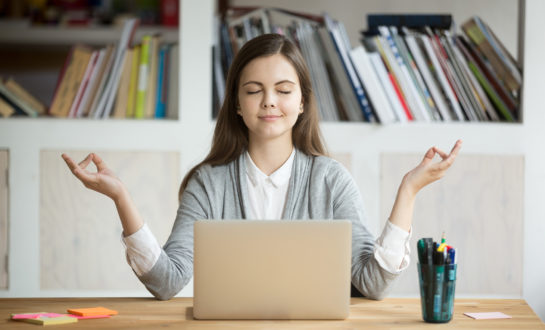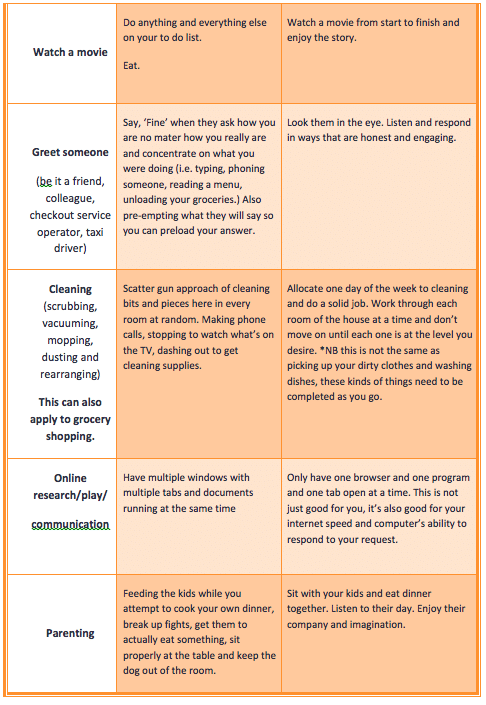

Mindfulness for Mental Health
In order for a goal to be achieved, you need to focus on it. You need to have a clear and targeted mission for what you want and how you are going to get there.
Unfortunately, many of us attempt to do a lot of things at once. We take on a whole bunch of goals and jam them into our regular routine, creating stress, fatigue and frustration. The result of that is a watered down focus and a watered down result. It can be pretty demotivating.
In the past, western society has been pretty hardwired to multi-tasking. It’s been a must-have item on your resume. As a parent, a partner and an employed professional or business owner, it can seem like everything we do requires multiple levels stacked high and performed simultaneously in order to ‘get it all done’.
How to use mindfulness for mental health
Multitasking is something that is being closely researched by mental health experts now. In our current high-stress environments ways to cut back on stress are a growing priority with stress a major contributor to personal leave, injury and serious health issues.
What new research is uncovering is that multi-tasking is actually really unproductive. By switching from one task to another repeatedly we are dimming down our brains ability to perform. A recent study of brain wave patterns compared images of the brain between people engaged in different activities. It was discovered that people who multitask have similar mental concentration levels of someone who is high on marijuana.
It’s pretty staggering to think we push ourselves through this mental fog, sometimes continuously all day for weeks, or even years on end expecting high levels of achievement. No wonder things are stressed.
Feeling stressed increases your emotions. When your emotions are up it becomes very difficult to think clearly, make rational decisions and see a wide range of choices. You can see how being stressed can lead to a person making more stressful decisions in their life. It can be a disastrous cocktail for stress-related injury, depression and burn out.
So how do you take some time out? It seems like the pressure to multitask comes from every aspect of life, from work to domestic, relationships, and even with our hobbies, there seems to be a continuous pressure to handle multiple things at one time.
Just like everything else, if you want to make a real change, it has to come from within. Once you can convince yourself you do not need to multitask, the pressure from outside sources will immediately drop.
It’s as easy and simple as focusing all your care and attention on one thing at a time.
For each task you ask yourself:
- What do I want to do?
- How am I going to achieve it?
- When am I going to achieve it by?
Once you have this focus and you learn to zero-in on the one single task then you will find your habit to stick to a single task gets stronger and stronger.
Benefits to single tasking your day
- Increased performance
- Increased efficiency
- Higher levels of engagement
- Ability to solve problems laterally
- Better concentration
- Ability to prioritise
- Better decision-making skills
- More energy
- More creativity
- Decreased amount of stress
The biggest gain is less stress. That means a calmer work environment, a more serene home life and more time and energy to do the things you really love. It also builds better relationships at work and home as you are more equipped to listen and respond to the needs of others as well as nurture your own needs.
You can make the move to single task days as gently as you like. You will notice results almost immediately, even if you only change a few things at a time. It creates great momentum to continue.
Think about how you can restructure your day, or your diary, or your boundaries to allow yourself to start one thing and finish one thing without any distractions.
Write down any times you notice that you automatically default to multitasking so you can place more emphasis on single-tasking these trouble spots. You might find you need to be flexible and make some small alterations in your life to achieve this. If you are really struggling to focus your attention on one thing at a time, talk to your coach.
Here is a list of activities people usually end up multitasking on.
Use this to identify your own multi-tasking habits and refocus your attention to “start one thing and finish one thing” and tap into a greater energy source and better IQ.
Most of these things will require a bit more time with a strong theme of lots more ‘you time’. When we are stressed we can forget to look after ourselves and invest in our mental wellbeing. If you find any resistance to giving yourself more time and love, write them down and discuss with your life coach.
If you are finding that you can’t break the pattern and you feel like you ‘should’ be multi-tasking all day, then come to our free Live it Now event where we will help you to break the pattern of stress.
Kindest regards,
Matt Catling








